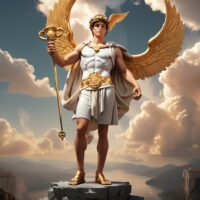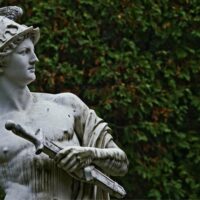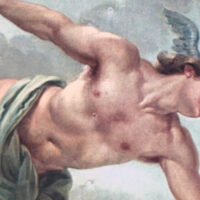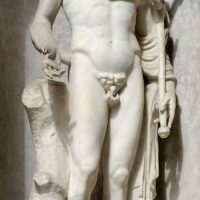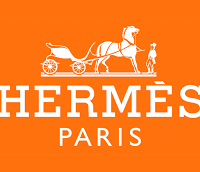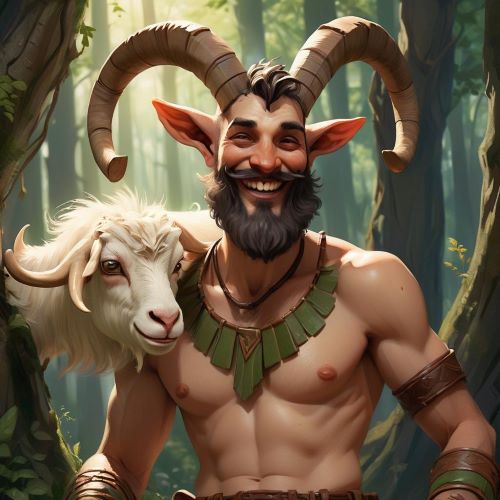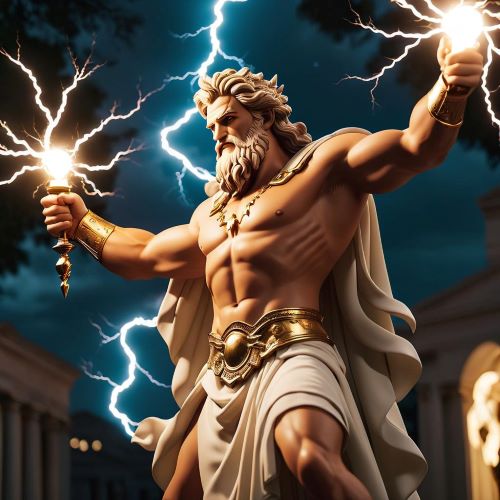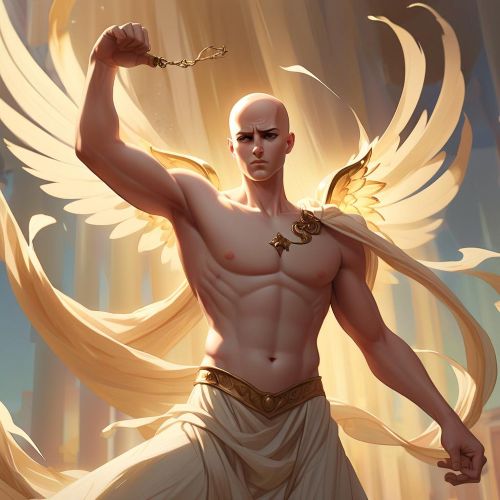Hermes : Messenger of the Gods
Listen
At a glance
| Description | |
|---|---|
| Origin | Greek Mythology |
| Classification | Gods |
| Family Members | Zeus (Father), Maia (Mother) |
| Region | Greece |
| Associated With | Trickery, Messages, Commerce |
Hermes
Introduction
Hermes, one of the most dynamic figures in Greek mythology, occupies a unique place among the Olympian gods. Revered as the messenger of the gods, he is also the protector of travelers, merchants, thieves, and orators. His role as a psychopomp, guiding souls safely to the afterlife, underscores his importance in the liminal spaces between life and death, mortals and divinity. Born to Zeus and Maia, one of the Pleiades, Hermes demonstrated extraordinary cunning from the very moment of his birth, famously inventing the lyre and stealing Apollo’s cattle on his first day of life. Across myth, Hermes embodies agility, intellect, and trickery, serving as a bridge between boundaries—both literal and metaphorical. Ancient texts, such as the Homeric Hymn to Hermes, describe him as “polytropos,” meaning versatile or cunning, highlighting his role as both a clever trickster and a divine mediator.
Physical Traits
Hermes’ imagery evolved significantly over centuries of Greek art. In Archaic Greece, he appeared as a mature, bearded man dressed like a shepherd or traveler, often depicted on stone markers called hermai, which denoted boundaries or graves. By Classical and Hellenistic times, artists favored portraying him as a youthful, athletic, and beardless figure, reflecting his more active and playful roles as messenger and trickster.
Several attributes make Hermes instantly recognizable. His wide-brimmed hat, the petasos, was initially practical for sun protection but later depicted with wings, emphasizing his speed. His winged sandals, talaria, symbolize his extraordinary mobility, allowing him to traverse both mortal and divine realms at will. The caduceus, a winged staff entwined with two snakes, represents negotiation, balance, and magical power, often associated with sleep, awakening, and authority. He is also shown carrying a purse or wearing a cloak that grants invisibility, underscoring his cunning nature. Ancient descriptions, including those in Homer’s Odyssey, emphasize his youthful vitality, while later Roman and Latin writers highlight his radiant beauty, golden hair, and meticulous appearance, reinforcing his image as an eternally young and agile god.
Family
Hermes was born to Zeus, the king of the Olympian gods, and Maia, the eldest Pleiad, in a hidden cave on Mount Cyllene in Arcadia. While Maia bore him alone, Hermes’ many paternal half-siblings—both divine and mortal—populate Greek myth. Among his divine siblings are Apollo and Dionysus, while mortal half-siblings include figures like Helen of Sparta, King Minos, and King Rhadamanthus.
Hermes’ interactions with other gods often reveal close fraternal bonds, especially with Apollo, with whom he shares playful rivalry, as in the myth of the stolen cattle. Artemis, the goddess of the hunt, instructed him in hunting skills, and Pan, the rustic god, taught him the art of music. Hermes’ unions produced numerous offspring. His most famous child is Hermaphroditus, born with Aphrodite, embodying both masculine and feminine beauty. Pan and the satyrs Pherespondus, Lycus, and Pronomus are other divine children, while mortal children such as Autolycus, the master thief and grandfather of Odysseus, and Aethalides, the herald of the Argonauts, inherited his cleverness and resourcefulness. Even Abderus, sometimes listed as his son, reflects Hermes’ adventurous influence.
Other names
Hermes is known by multiple epithets, each highlighting a different aspect of his versatile personality. The Romans adopted him as Mercury, a name derived from merx, meaning merchandise, emphasizing his connection to commerce. Among his Greek titles are Argeïphontes, “slayer of Argus,” recalling his cunning defeat of the hundred-eyed guardian; Cyllenius, after his birthplace Mount Cyllene; and Psychopompos, the guide of souls to the underworld. Dolios emphasizes his trickster nature, while Aggelos and Diaktoros recognize his role as divine messenger. He is also known as Epimelios, caretaker of flocks, Kriophoros, bearer of the ram, Hodios, patron of travelers, and Agoraios, guardian of marketplaces. Additional titles like Logios, celebrating his eloquence, and Chthonius, reflecting his underworld connections, further illustrate the complexity of his divine functions.
Powers and Abilities
Hermes possesses the full range of Olympian abilities, including superhuman strength, agility, and immortality. Yet his defining power lies in his speed and versatility, allowing him to traverse the heavens, earth, and underworld with ease. As messenger of the gods, he communicates swiftly and effectively across realms, while his role as psychopomp ensures the safe passage of souls to Hades.
Hermes is also the god of commerce, travelers, and thieves, blending cunning with practicality. He demonstrates ingenuity through his inventions, such as the lyre crafted from a tortoise shell, and is sometimes credited with creating writing, numbers, and measurement. Athletic competitions, dreams, and oratory all fall under his domain. His ability to send prophetic dreams, known as Oneiros, and to act as an interpreter, links him to both wisdom and the spoken word. Hermes’ dual nature—mischievous yet benevolent, inventive yet protective—makes him one of Greek mythology’s most human and relatable deities.
Modern Day Influence
Hermes’ influence extends far beyond ancient Greece. In Roman culture, Mercury retained many of Hermes’ traits, particularly as a god of commerce and communication. His symbols, especially the caduceus, are widely recognized today, though often misapplied as medical icons. Hermes also inspires literature, appearing in modern novels, graphic novels, and films, from Rick Riordan’s Percy Jackson series to Neil Gaiman’s American Gods.
In spiritual traditions like Wicca, Hermes embodies the principles of communication, guidance, and balance, functioning as a mediator between energies and realms. Jungian psychology interprets him as an archetype of the trickster and the unconscious guide, bridging the known and unknown. Even in fashion, the luxury brand Hermès echoes the god’s association with travel, elegance, and refinement. Hermes’ enduring appeal lies in his symbolism: a god of movement, transformation, and connection, whose qualities resonate in both myth and the modern world.
Related Images
Source
The Editors of Encyclopaedia Britannica. (n.d.). Hermes Characteristics, Family, & Myth. Encyclopaedia Britannica. Retrieved from https://www.britannica.com/topic/Hermes-Greek-mythology
Cartwright, M. (2019, August 28). Hermes: The Messenger of the Olympian Gods. World History Encyclopedia. Retrieved from https://www.worldhistory.org/Hermes/
Greek Mythology Worldwide. (2024, September 25). The Myths of Hermes and His Impact on Ancient Greek Society. Retrieved from https://greek.mythologyworldwide.com/the-myths-of-hermes-and-his-impact-on-ancient-greek-society/
Hermes :: The Messenger of the Gods – Greek Mythology. (2023, April 19). Greek Mythology.com. Retrieved September 9, 2025, from https://www.greekmythology.com/Olympians/Hermes/hermes.html.
Wikipedia. Retrieved September 9, 2025, from https://en.wikipedia.org/wiki/Hermes.
Hermes, Messenger of the Gods, and His Connection to Wicca. (2025, January 1). All Wicca. Retrieved September 9, 2025, from http://www.allwicca.com/hermes-greek-god-messenger.
A Complete Family Tree of the Greek God of Herds in Greek Mythology. (2024, May 8). History Cooperative. Retrieved September 9, 2025, from https://historycooperative.org/hermes-family-tree/.
Facts About the Olympian God Hermes – ThoughtCo. (2025, May 13). ThoughtCo. Retrieved September 9, 2025, from https://www.thoughtco.com/fast-facts-about-hermes-116583.
Hard, R. (2003). A Handbook of Greek Mythology.
Taylor & Francis.Squier, R. (2019). Hermes: God of travels and trade. The Child’s World.
Temple, T. (2020). Hermes: God of Travels and Trade. Epic.
Frequently Asked Questions
What is lorem Ipsum?
I am text block. Click edit button to change this text. Lorem ipsum dolor sit amet, consectetur adipiscing elit. Ut elit tellus, luctus nec ullamcorper mattis, pulvinar dapibus leo.
What is lorem Ipsum?
I am text block. Click edit button to change this text. Lorem ipsum dolor sit amet, consectetur adipiscing elit. Ut elit tellus, luctus nec ullamcorper mattis, pulvinar dapibus leo.
What is lorem Ipsum?
I am text block. Click edit button to change this text. Lorem ipsum dolor sit amet, consectetur adipiscing elit. Ut elit tellus, luctus nec ullamcorper mattis, pulvinar dapibus leo.
What is lorem Ipsum?
I am text block. Click edit button to change this text. Lorem ipsum dolor sit amet, consectetur adipiscing elit. Ut elit tellus, luctus nec ullamcorper mattis, pulvinar dapibus leo.
What is lorem Ipsum?
I am text block. Click edit button to change this text. Lorem ipsum dolor sit amet, consectetur adipiscing elit. Ut elit tellus, luctus nec ullamcorper mattis, pulvinar dapibus leo.


